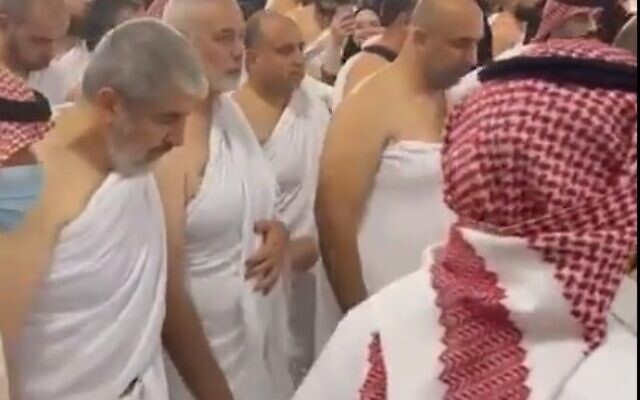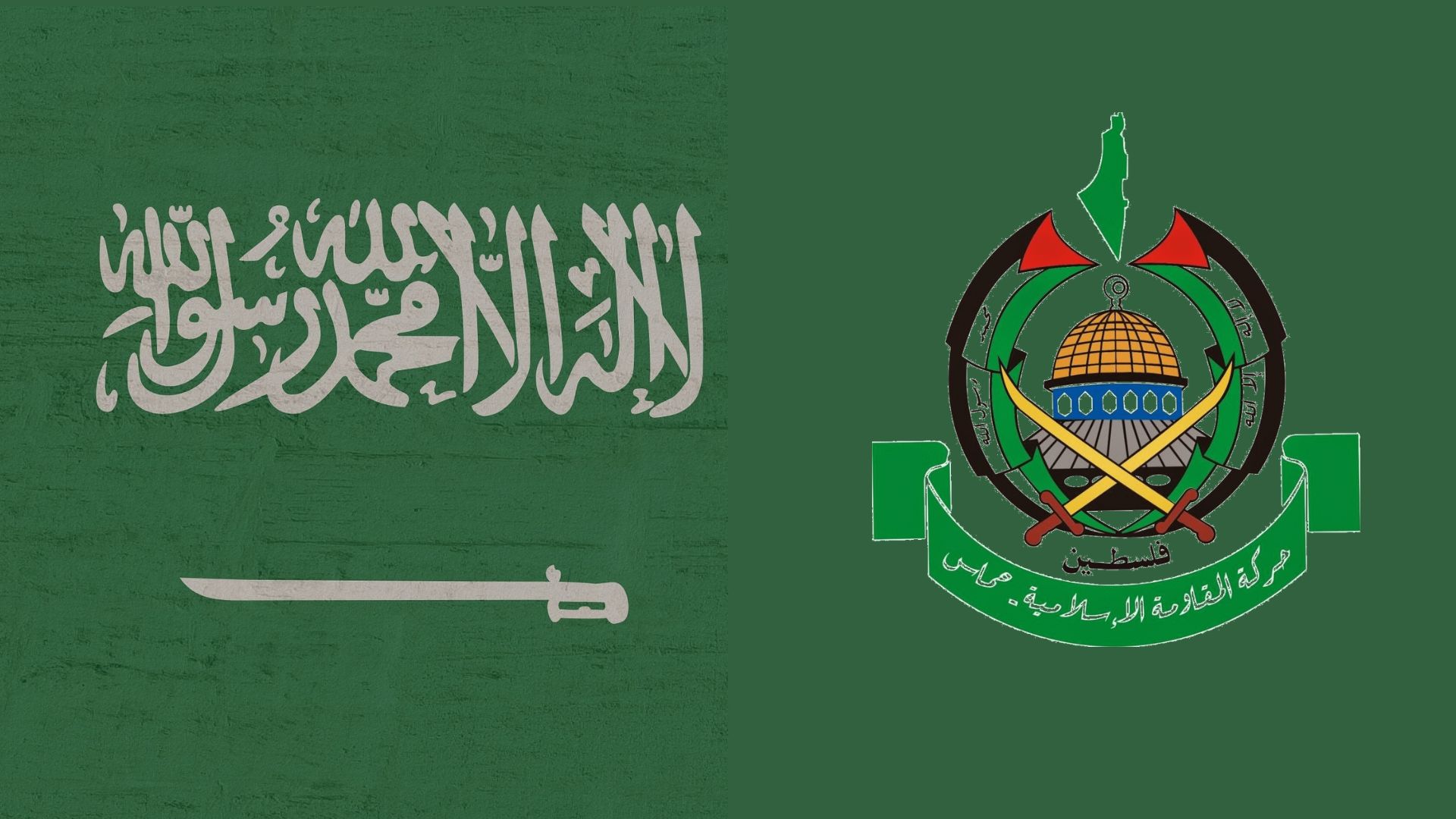Publications
INSS Insight No. 1722, May 11, 2023
A part of the current regional detente between countries and organizations in the Middle East is the growing closeness between Saudi Arabia and Hamas, evidenced by the recent visit of Hamas leaders to the Kingdom and the release of Hamas prisoners held there. In principle, rapprochement between Saudi Arabia and Hamas should not affect the normalization process, as long as Israel is perceived as a stable democratic actor that contributes to regional security and stability.
The Hamas leadership, including Chairman of the Political Bureau Ismail Haniyeh, visited Saudi Arabia in April 2023. Haniyeh was accompanied by Khaled Mashal and Mousa Abu Marzouk, previous chairmen of the organization who continue to hold senior positions, and Khalil al-Hayya, deputy of Yahya Sinwar and head of the organization’s Information Bureau.
The visit arouses interest because relations between the Saudi royal house and Hamas were severed in 2007, and since then, palpable tension has defined the relations between them. Hamas is perceived as a militant faction of the Muslim Brotherhood that maintains relations with Iran, the Kingdom’s principal enemy. In 2014 the Muslim Brotherhood was added to the Saudi list of terror organizations, and their activists, including Hamas members, were imprisoned. In 2021, Riyadh imposed heavy prison sentences of up to 22 years on 64 of the organization’s senior members and activists on charges of money laundering and support for the Hamas military wing. Among those condemned to lengthy prison terms (15 years) was the head of the Hamas delegation to the Kingdom, Dr. Mohammed al-Hudari, who was released in October 2022 and subsequently died. In one of his moments of frustration with Saudi Arabia, Khaled Mashal hinted that the arrests were intended to please Israel, in the context of its growing closeness to the Kingdom.
The last visit to Saudi Arabia by a Hamas delegation was in 2015, made for the formal purpose of observing the commandment of Umrah but which included meetings with Crown Prince Mohammed bin Salman, the Defense Minister and head of Saudi Intelligence. The outcome then did not satisfy the Hamas delegation, which hoped for a change in policy toward their organization, particularly on the issue of the prisoners. The purpose of the recent visit, according to Hamas, was also to observe the Umrah, and as far as is known, before the Hamas delegation returned to Doha, there were no meetings with Saudi officials (or if there were meetings, they have not been made public). All information on this matter has come from sources close to Hamas.

The recent visit appears to be part of the increasingly evident trend toward a thaw in relations among Arab states, and between them and Turkey, Iran, Syria, and organizations associated with them. In addition to the Hamas delegation, and apparently with the aim of demonstrating a balanced approach, the Palestinian Authority President Mahmoud Abbas was also invited to the Iftar banquet in Riyadh. This closeness to the Palestinian Authority also represents a change, since Saudi Arabia has been cold toward Abbas in recent years, and has occasionally frozen its aid to the PA to show its disapproval of what it sees as Abbas’ uncompromising position on the Trump Plan, and with an interest in influencing the choice of his successor. The proximity of the visits prompted speculation that Riyadh seeks to strengthen its influence in the Gaza Strip and perhaps promote reconciliation between Hamas and the Palestinian Authority, possibly on the basis of the 2007 agreement between Hamas and Fatah – the Mecca Agreement, which was not implemented. Whatever the case, Abbas’s visit to Riyadh was announced publicly by the kingdom.
In 2021 Hamas launched a new strategy, aimed to topple the Palestinian Authority from within and strengthen its own status both as a central element in the Israel-Palestine equation and as a meaningful political actor in the region. The goal was to force Israel and other relevant entities to recognize Hamas as the proper definitive Palestinian address. After Operation Guardian of the Walls in May 2021, the heads of the organization publicly thanked Iran for its extensive aid to Hamas in particular, and to the Palestinian “resistance” – funding for activities, and the provision of much knowhow and equipment. The recorded speech by Iranian President Ebrahim Raisi broadcast in the Gaza Strip on Jerusalem Day in April 2023, and the speech by the Quds Force commander broadcast on Jerusalem Day in 2022, included expressions of gratitude by Hamas to Iran.
The visit of Hamas leaders to Saudi Arabia and the release of Hamas prisoners held in the Kingdom before and after the visit should be viewed in the context of regional developments led largely by the Saudis. Before the visit to Riyadh, Mousa Abu Marzouk, who handles foreign relations for Hamas, tried to correct the impression created after rockets were fired into Israel by the organization from Lebanon and the Gaza Strip in April, and the escalation in Israeli-Palestinian tension around the al-Aqsa Mosque during Ramadan, that Hamas had become part of the Iran-led “axis of resistance.” He clarified that Hamas was and remains an independent organization that is not part of any one axis. The message was intended to soothe the well-known Saudi sensitivity on this subject.
Is a new Saudi policy unfolding, to the benefit of Hamas? And if so, how should the parallel visit of Abbas, who was received in Riyadh with the honor reserved for heads of state, be understood? It appears that the visit of the Hamas delegation was another layer in the new policy adopted by Saudi Arabia, designed to reduce tensions and hostility with countries in the region, to enable the advance of large projects and enhance the surge of internal development. One reflection of this policy is the tempered antagonism to political Islam; relations with Hamas, which is part of this stream and very close to Iran, are part of this trend.
At the same time, the parallel invitation to Abbas sent a message to all concerned, including Israel, that at work is not a matter of a political change but a desire for balance as part of the damage containment efforts in view of changing regional and international priorities. Saudi Arabia, which invited Syria to participate in the Arab summit in Riyadh on May 19, after working to reinstate its membership in the Arab League, also wants to regain the main regional leadership roles and draw the Arab world round it, using its traditional tools of influence – funding and mediation – and abandoning futile attempts to change the situation by military means.
For Israel, and to a large extent for the United States as well, the message emerging from these developments is that due to the changing dynamics and balances of power in the region, in which regional actors are expected to assume a position and even become involved, it will be difficult to maintain the continuing freeze on the Palestinian question for the long term. At the same time, rapprochement between Saudi Arabia and Hamas could have positive ramifications, since the Kingdom could have a restraining influence on the organization – perhaps even at the expense of its relations with Iran.
However, even if the recent moves by Saudi Arabia toward regional reconciliation were not intended to stop the normalization process with Israel, it appears that the process has slowed down significantly. There is a great deal of regional (and international) discussion over the composition of the current Israeli government, due to the erosion of Israel’s image as a stable democracy and the United States’ main ally in the region, and of the image of Prime Minister Benjamin Netanyahu as a strong leader. In such a situation, it is hard for Riyadh to see relations with Israel as a substitute for efforts to calm tensions with its enemies in the region, and above all with Iran. After all, in the eyes of Israel’s neighbors, government stability was one of its sources of strength, and one of their motivations to seek closer ties with it.



